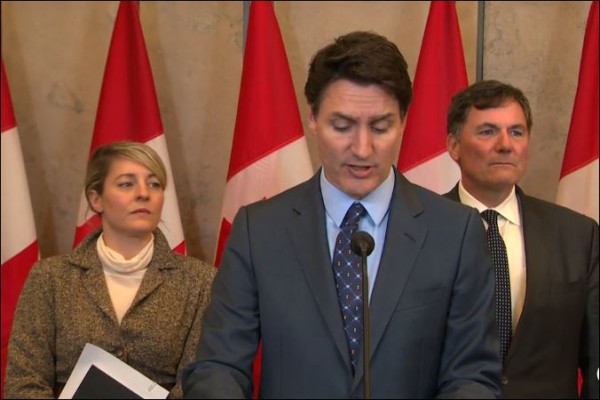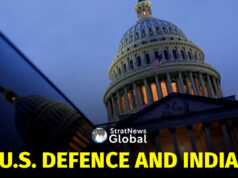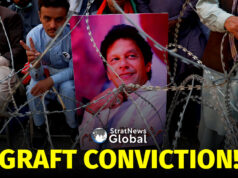
In a rapid series of escalatory events, India and Canada moved from trading diplomatic barbs to expelling each other’s diplomats on Monday over the killing of a Khalistani activist in British Columbia last year.
On Monday morning in Ottawa, the Royal Canadian Mounted Police issued an ‘unprecedented’ statement alleging “violent criminal activity occurring in Canada with connections to agents of the Government of India.”
The RCMP said it had “obtained evidence that demonstrates four very serious issues: Violent extremism impacting both countries; Links tying agents of the Government of India (GOI) to homicides and violent acts; The use of organized crime to create a perception of an unsafe environment targeting the South Asian Community in Canada; and Interference into democratic processes.”
Canada has publicly accused Indian officials of being responsible for the murder of Hardeep Singh Nijjar, a Khalistani activist, who was gunned down killed outside his home in Surrey, Canada in June 2023.
“Indian diplomats and consular officials based in Canada leveraged their official positions to engage in clandestine activities, such as collecting information for the Government of India, either directly or through their proxies; and other individuals who acted voluntarily or through coercion…. The information collected for the Government of India is then used to target members of the South Asian community,” the RCMP said.
After the RCMP press conference, Canadian Foreign Affairs Minister Mélanie Joly issued a statement saying that Canada expelled six Indian diplomats after India refused to waive their diplomatic and consular immunities and co-operate with the police investigation.
And in a press conference later in the afternoon, Trudeau, accompanied by Joly and Public Safety Minister Dominic LeBlanc, said that Trudeau said India’s actions were were “unacceptable,” and despite attempts by the RCMP and national security officials to work with the Indian government and law enforcement, they’ve been “repeatedly refused.”
Both Trudeau and Joly insisted they were not looking for a spat with India, but that Canada would not tolerate violations of its sovereignty by any nation.
“This is why, this weekend, Canadian officials took an extraordinary step,” Trudeau said. “They met with Indian officials to share RCMP evidence which concluded six agents of the Government of India are persons of interest in criminal activities and despite repeated requests to the government of India, it has decided not to cooperate.”
Meanwhile, The Washington Post reported Monday morning that based in part on apparent communications intercepts, the Canadian government had linked India’s Home Minister Amit Shah directly to the investigation into the Nijjar murder.
In India earlier in the day, the ministry of external affairs issued a 500 word release in response to what it described as a “diplomatic communication from Canada suggesting that the Indian High Commissioner and other diplomats are ‘persons of interest’ in a matter related to an investigation in that country.”
Dismissing the Canadian note as part of a political agenda of the Trudeau Government that is centred around vote bank politics, the MEA release claimed that India’s repeated requests for hard evidence proving India’s role had been ignored.
Instead, the “Trudeau Government has consciously provided space to violent extremists and terrorists to harass, threaten and intimidate Indian diplomats and community leaders in Canada,” it said, and warned that India reserved the right to “take further steps.”
Sure enough, hours later, another release said that the Canadian acting high commissioner Stewart Wheeler had been summoned by the Secretary East, and told that since India had “no faith in the current Canadian Government’s commitment to ensure their security,” New Delhi had decided to withdraw its the High Commissioner and other targeted diplomats and officials from Canada.
After the meeting, Wheeler told Indian journalists that “…Canada has provided credible, irrefutable evidence of ties between agents of the Government of India and the murder of a Canadian citizen on Canadian soil. Now, it is time for India to live up to what it said it would do and look into all those allegations.”
A subsequent MEA release announced that the Wheeler his deputy and four first secretaries had been given till noon Saturday October 19 to leave the country.
According to Indian narrative, ““This latest step (Canada’s accusations) follows interactions that have again witnessed assertions without any facts. This leaves little doubt that on the pretext of an investigation, there is a deliberate strategy of smearing India for political gains.”
In a career spanning three decades and counting, Ramananda (Ram to his friends) has been the foreign editor of The Telegraph, Outlook Magazine and the New Indian Express. He helped set up rediff.com’s editorial operations in San Jose and New York, helmed sify.com, and was the founder editor of India.com.
His work has featured in national and international publications like the Al Jazeera Centre for Studies, Global Times and Ashahi Shimbun. But his one constant over all these years, he says, has been the attempt to understand rising India’s place in the world.
He can rustle up a mean salad, his oil-less pepper chicken is to die for, and all it takes is some beer and rhythm and blues to rock his soul.
Talk to him about foreign and strategic affairs, media, South Asia, China, and of course India.




